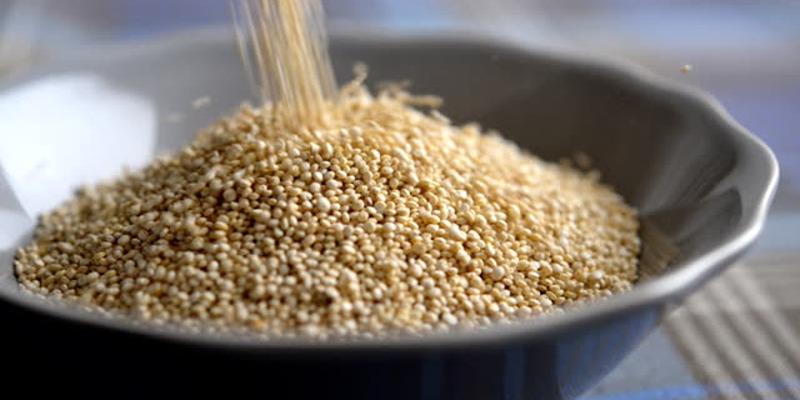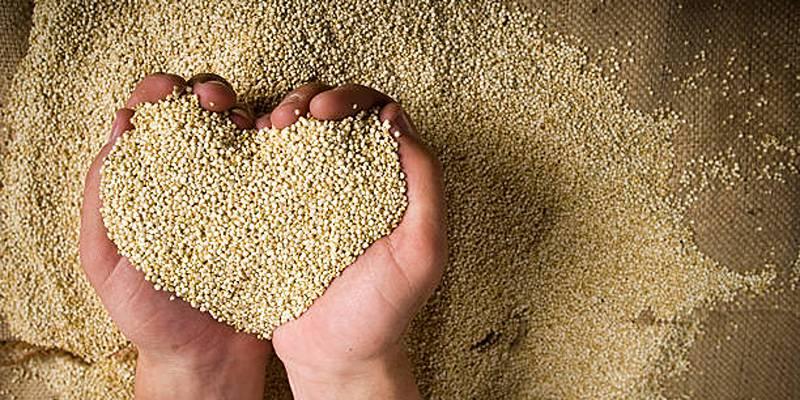Unlock the Superfood Secrets of Quinoa: Your Guide to a Healthier Pantry
Mar 02, 2024 By Nancy Miller
In recent years, quinoa has emerged as a superstar in the realm of superfoods. Praised for its nutritional benefits and versatility in the kitchen, quinoa has captured the attention of health-conscious individuals and culinary enthusiasts alike. Whether you're aiming to elevate your diet or simply seeking alternative grains for your pantry, unlocking the secrets of quinoa can pave the way to a healthier lifestyle. Join us as we delve into the wonders of this ancient grain and discover how it can transform your culinary adventures.
What is Quinoa?

Quinoa (pronounced keen-wah) is a nutrient-dense seed that originates from the Andean region of South America. Although commonly referred to as a grain, quinoa is technically a pseudocereal, belonging to the same family as spinach and beets. Cultivated for thousands of years by indigenous peoples, quinoa gained widespread popularity due to its exceptional nutritional profile and adaptability to various climates.
Nutritional Powerhouse:
One of the primary reasons behind quinoa's acclaim is its impressive nutritional composition. Quinoa is rich in fiber, vitamins, and minerals, including magnesium, iron, and manganese. Its low glycemic index also makes it a suitable option for individuals managing blood sugar levels.
Health Benefits:
Incorporating quinoa into your diet offers a myriad of health benefits. Its high protein content supports muscle repair and growth, making it a valuable addition to post-workout meals. The fiber in quinoa promotes digestive health and aids in weight management by promoting satiety. Furthermore, the abundance of antioxidants in quinoa helps combat oxidative stress and inflammation, reducing the risk of chronic diseases such as heart disease and diabetes.
Versatility in the Kitchen:
One of the most appealing aspects of quinoa is its versatility in culinary applications. Whether you're craving a hearty salad, savory pilaf, or nutritious breakfast bowl, quinoa can adapt to various flavor profiles and cooking techniques. Its mild, nutty taste provides a neutral base for a wide range of ingredients, allowing for endless creativity in the kitchen. From soups and stews to burgers and desserts, the possibilities with quinoa are virtually limitless.
Cooking Tips and Techniques:
- Rinse thoroughly: Before cooking quinoa, it is essential to rinse it thoroughly. Quinoa seeds have a natural coating called saponin, which can cause a bitter taste if not removed.
- Cook in broth or stock: To enhance the flavor of your quinoa, try cooking it in vegetable or chicken broth instead of water.
- Use the right ratio: A general rule for cooking quinoa is using a 2:1 ratio of liquid to quinoa. For every cup of quinoa, use two cups of water or broth.
Recipe: Quinoa and Roasted Vegetable Salad:
Ingredients:
- 1 cup uncooked quinoa
- 2 cups vegetable broth
- 1 red bell pepper, diced
- 1 zucchini, diced
- 1 small red onion, diced
- 2 cloves of garlic, minced
- ¼ cup crumbled feta cheese
- Salt and pepper to taste
Instructions:
- Preheat your oven to 400°F (200°C).
- While the quinoa is cooking, spread the diced vegetables on a baking sheet lined with parchment paper. Drizzle with olive oil and sprinkle with salt and pepper.
- Roast the vegetables in the oven for 20-25 minutes, or until tender and lightly browned.
- Once the quinoa is cooked, fluff it with a fork and let it cool for a few minutes.
- In a large bowl, combine the quinoa, roasted vegetables, minced garlic, cherry tomatoes, and crumbled feta cheese. Mix well.
- Season with salt and pepper to taste.
- Serve as a side dish or add protein (such as grilled chicken or tofu) for a complete meal.
Exploring Quinoa Varieties:
While white quinoa is the most common variety found in supermarkets, there are several other types worth exploring. Red quinoa, with its slightly nuttier flavor and firmer texture, adds a pop of color to salads and pilafs. Black quinoa, prized for its earthy flavor and robust texture, lends itself well to hearty grain bowls and side dishes. Tri-color quinoa, a blend of white, red, and black varieties, offers a visually appealing alternative for diverse culinary creations. Experimenting with different quinoa varieties allows you to discover unique flavor profiles and textures that suit your palate.
Quinoa Beyond the Plate:
Beyond its culinary applications, quinoa has found its way into various non-food products, thanks to its beneficial properties. Skincare products infused with quinoa extract claim to nourish and rejuvenate the skin, offering anti-aging and moisturizing benefits. Quinoa-based haircare products tout their ability to strengthen and repair damaged hair, leaving it soft, shiny, and manageable. Additionally, quinoa is used in eco-friendly packaging materials due to its biodegradable nature, offering a sustainable alternative to conventional plastics.
The Future of Quinoa:

As global interest in healthy eating and the popularity of quinoa continue to rise, the demand for this superfood is expected to skyrocket. However, it is crucial to recognize and address the concerns surrounding the environmental and socio-economic impact of quinoa cultivation, particularly in its countries of origin.
To ensure the long-term sustainability of quinoa production and uplift local communities, it is of utmost importance to embrace sustainable farming practices that minimize the use of harmful chemicals and prioritize soil health. This entails adopting organic farming methods, implementing crop rotation, and employing efficient irrigation systems to conserve water.
Besides sustainable farming practices, advocating for fair trade initiatives can play a crucial role in guaranteeing equitable wages and improved working conditions for quinoa farmers. By endorsing fair trade organizations and certification programs, we can actively contribute to the economic empowerment of these farmers and alleviate poverty in regions where quinoa is produced.
Conclusion:
Quinoa stands out as a nutritional powerhouse that deserves a place of honor in every pantry. Its exceptional nutrient profile, health benefits, and culinary versatility make it a valuable ingredient for anyone striving to maintain a healthy lifestyle. By incorporating quinoa into your meals, you can unlock a world of delicious possibilities while nourishing your body with essential nutrients. Embrace the superfood secrets of quinoa and embark on a journey to a healthier, more vibrant you.







